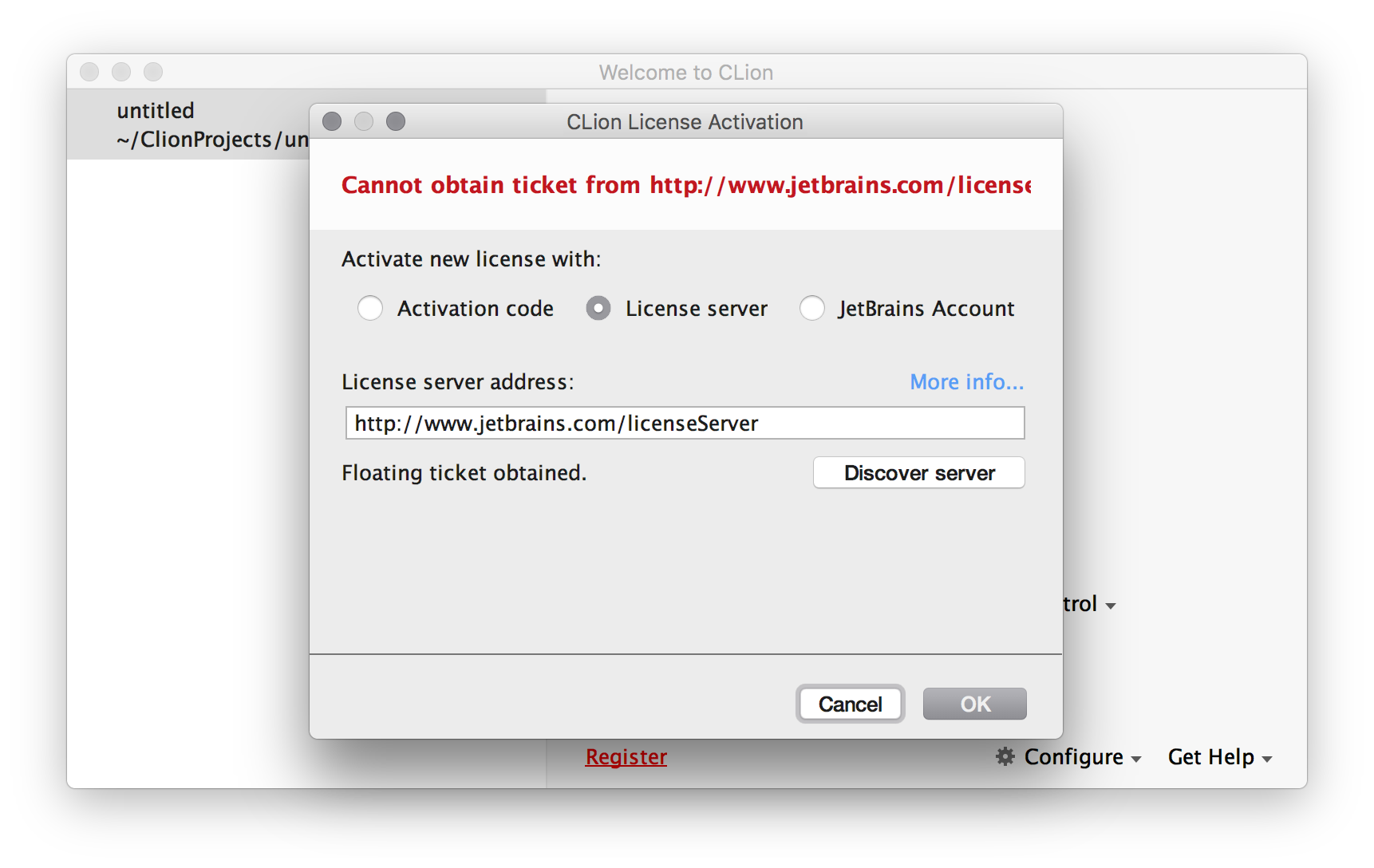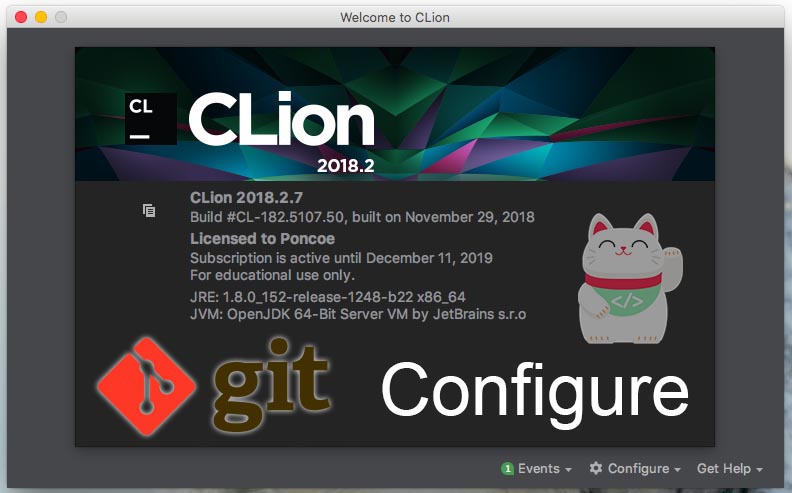Clion License Server Github
Contribute to kurron/docker-clion development by creating an account on GitHub. Simply run xhost + to allow the container to connect to your X server. License and Credits. This project is licensed under the Apache License Version 2.0, January 2004. IntelliJ IDEA License Server. GitHub Enterprise Server is the on-premises deployment of GitHub.com, built for collaboration and hosted on your own Azure environment. Start your 45-day free trial of Enterprise Server and request a trial license! Port details: jetbrains-clion JetBrains CLion IDE 2020.2 devel =0 2020.1.2 Version of this port present on the latest quarterly branch. Maintainer: dmitry.wagin@ya.ru Port Added: 2019-05-26 18:59:36 Last Update: 2020-08-02 10:35:32 SVN Revision: 543937 Also Listed In: java License: IntelliJ-CLion Description: CLion - A cross-platform IDE for C and C.
There is an official Jetbrains plugin Conanplugin for CLion.
You can read how to use it in the following blog post
General Integration¶
CLion uses CMake as the build system of projects, so you can use the CMake generator to manage your requirements in your CLion project.
Just include the conanbuildinfo.cmake this way:
If the conanbuildinfo.cmake file is not found, it will print a warning message in the Messages console of your CLion IDE.
Using packages in a CLion project¶
Let see an example of how to consume Conan packages in a CLion project. We are going to require and usethe zlib conan package.
- Create a new CLion project
- Edit the
CMakeLists.txtfile and add the following lines:
3. CLion will reload your CMake project and you will be able to see a Warning in the console, because theconanbuildinfo.cmake file still doesn’t exist:
4. Create a conanfile.txt with all your requirements and use the cmake generator. In this case we onlyrequire the zlib library from a Conan package:
5. Now you can run conan install for debug in the cmake-build-debug folder to install your requirements andgenerate the conanbuildinfo.cmake file there:
6. Repeat the last step if you have the release build types configured in your CLion IDE, but change the build_typesetting accordingly:
- Now reconfigure your CLion project. The Warning message is not shown anymore:
8. Open the library.cpp file and include zlib.h. If you follow the link, you can see that CLion automaticallydetects the zlib.h header file from the local Conan cache.
- Build your project normally using your CLion IDE:
You can check a complete example of a CLion project reusing conan packages in this github repository: lasote/clion-conan-consumer.
Creating Conan packages in a CLion project¶
Now we are going to see how to create a Conan package from the previous library.
- Create a new CLion project
- Edit the
CMakeLists.txtfile and add the following lines:
- Create a
conanfile.pyfile. It’s recommended to use the conan new command.
Edit the conanfile.py:
- We are removing the
sourcemethod because we have the sources in the same project; so we can use theexports_sources. - In the
package_infomethod, adjust the library name. In this case ourCMakeLists.txtcreates a target library calledmylibrary. - Adjust the CMake helper in the
build()method. Thecmake.configure()doesn’t need to specify thesource_folder, becausewe have thelibrary.*files in the root directory. - Adjust the
copyfunction calls in thepackagemethod to ensure that all your headers and libraries are copied to the Conan package.
- To build your library with CLion, follow the guide of Using packages from step 5.
5. To package your library, use the conan export-pkg command passing the used build-folder. Itwill call your package() method to extract the artifacts and push the Conan package to the localcache:
- Now you can upload it to a Conan server if needed:

8. If you would like to see how the package looks like before exporting it to the local cache (conan export-pkg)you can use the conan package command to create the package in a local directory:
Stream free Hollywood movies, TV series and originals on your favorite devices. Yes, free, always and forever. Watch premium TV shows and movies from a full library of new and iconic hits. All on-demand, without a subscription. Set up a free account to see fewer ads and to pick up where you left off on any device. Filter genres like comedy, drama, action, thriller and fandom to. Crackle app free download.
If we list the mypackage folder we can see:
- A
libfolder containing our library - A
includefolder containing our header files - A
conaninfo.txtandconanmanifest.txtconan files, always present in all packages.
You can check a full example of a CLion project for creating a Conan package in this github repository: lasote/clion-conan-package.
Article version: Enterprise Server 2.22
Article version: Enterprise Server 2.22
You can view, manage, and update your GitHub Enterprise license.
In this article
About GitHub Enterprise licenses
When you purchase or renew GitHub Enterprise, you receive a license file to validate your application. A license file has an expiration date and controls the number of user licenses you can add to GitHub Enterprise. After you download and install GitHub Enterprise, uploading the license file unlocks the application for you to use.
You can allocate the user licenses included in your GitHub Enterprise license to users in your GitHub Enterprise Server instance and a GitHub Enterprise Cloud enterprise account. When you add a user to either environment, they will consume a license. If a user has accounts in both environments, to consume only one license, their primary GitHub Enterprise email address must be the same as their verified GitHub Enterprise Cloud email address. You can sync license count and usage between the environments.
If your GitHub Enterprise Server license expires, you won't be able to access your GitHub Enterprise Server instance via a web browser or Git. If needed, you will be able to use command-line utilities to back up all your data. For more information, see 'Configuring backups on your appliance.' If you have any questions about renewing your license, contact GitHub's Sales team.
Uploading a new license to GitHub Enterprise Server
Clion License Server Github Plugin
After you purchase a new license or upgrade an existing license from GitHub's Sales team, you must download your new license file, then upload the file to GitHub Enterprise Server to unlock your new user licenses.
If you'd like to renew or add user licenses to GitHub Enterprise, contact GitHub's Sales team. Your new license file will be available for download immediately after you complete your order.
Navigate to GitHub.com.
In the top-right corner of GitHub.com, click your profile photo, then click Your enterprises.
In the list of enterprises, click the enterprise you want to view.
In the enterprise account sidebar, click Settings.
In the left sidebar, click Enterprise licensing.
Under 'Enterprise Server Instances', click to download your license file.
Log into your GitHub Enterprise Server instance as a site administrator.
In the top-right corner of GitHub Enterprise Server, click your profile photo, then click Enterprise settings.
In the enterprise account sidebar, click Settings.
In the left sidebar, click License.
Under 'Quick links', click Update license.
To select your license, click License file, or drag your license file onto License file.
Click Upload.
Viewing license usage
Navigate to GitHub.com.
In the top-right corner of GitHub.com, click your profile photo, then click Your enterprises.
In the list of enterprises, click the enterprise you want to view.
In the enterprise account sidebar, click Settings.
In the left sidebar, click Enterprise licensing.
Review your current GitHub Enterprise license, as well as consumed and available user licenses.
Automatically syncing user license usage with GitHub Enterprise Cloud
You can use GitHub Connect to automatically sync user license count and usage between GitHub Enterprise Server and GitHub Enterprise Cloud. For more information, see 'Enabling automatic user license sync between GitHub Enterprise Server and GitHub Enterprise Cloud.'
Manually syncing user license usage between GitHub Enterprise Server and GitHub Enterprise Cloud
Clion License Server
You can download a JSON file from GitHub Enterprise Server and upload the file to GitHub Enterprise Cloud to manually sync user license usage between the two deployments.

In the top-right corner of GitHub Enterprise Server, click your profile photo, then click Enterprise settings.
In the enterprise account sidebar, click Settings.
In the left sidebar, click License.
Under 'Quick links', to download a file containing your current license usage on GitHub Enterprise Server, click Export license usage.
Navigate to GitHub.com.
In the top-right corner of GitHub.com, click your profile photo, then click Your enterprises.
In the list of enterprises, click the enterprise you want to view.
In the enterprise account sidebar, click Settings.
In the left sidebar, click Enterprise licensing.
In the left sidebar, click License.
Star stable club name generator fortnite. Under 'Enterprise Server Instances', click Add server usage.
Upload the JSON file you downloaded from GitHub Enterprise Server.
Help us make these docs great!
All GitHub docs are open source. See something that's wrong or unclear? Submit a pull request.
Make a contributionClion License Server 2020
Or, learn how to contribute.
